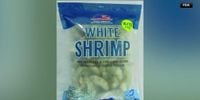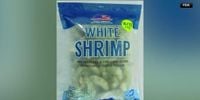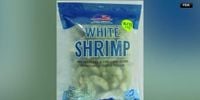On August 21 and 22, 2025, news outlets across the United States reported a growing recall of frozen shrimp products due to concerns about radioactive contamination. Federal officials sounded the alarm after discovering traces of Cesium-137, a radioactive isotope, in multiple shrimp shipments and samples, sending ripples of concern through consumers and the seafood industry alike.
According to the Associated Press, the latest recall involves California-based Southwind Foods, which pulled several brands of frozen shrimp—Sand Bar, Arctic Shores, Best Yet, Great American, and First Street—from shelves. The bagged products were distributed between July 17 and August 8, 2025, reaching stores and wholesalers in nine states: Alabama, Arizona, California, Massachusetts, Minnesota, Pennsylvania, Utah, Virginia, and Washington state. The scope of the recall is significant, affecting both large retailers and smaller outlets across these regions.
But Southwind Foods wasn't the only company caught in the radioactive net. During the same week, Walmart stores took action by recalling packages of Great Value frozen raw shrimp in 13 states. The move followed a safety alert from the U.S. Food and Drug Administration (FDA), which detected Cesium-137 in shipping containers arriving at four U.S. ports and in a sample of frozen breaded shrimp imported by BMS Foods of Indonesia. The FDA's swift response underscores the seriousness of the threat, especially as the agency explicitly advises consumers not to eat any of the recalled products.
So what exactly is Cesium-137, and why is it such a concern? As reported by the Associated Press, Cesium-137 is a radioactive isotope produced as a byproduct of nuclear reactions. While trace amounts of Cesium-137 are already present in the environment—showing up in food, soil, and air—the danger lies in prolonged, repeated exposure. The primary health risk, according to experts, is an increased chance of developing cancer over time. The FDA's warning is clear: even low-dose, long-term exposure to radioactive substances like Cesium-137 can be hazardous to human health.
The recall has left shoppers uneasy, especially those who purchased frozen shrimp during the affected time frame. The FDA's safety alert and the companies' voluntary recalls are intended to limit potential harm, but questions about how radioactive material entered the food supply remain. In particular, the discovery of Cesium-137 in both shipping containers and imported shrimp samples points to a broader issue in the global seafood trade. BMS Foods of Indonesia, whose breaded shrimp tested positive for the isotope, is now facing scrutiny over its supply chain and safety protocols.
For many Americans, shrimp is a staple of summer barbecues, family gatherings, and restaurant menus. The news of radioactive contamination has cast a shadow over what should be a celebratory season, especially with the nation approaching its 250th anniversary. While there is no immediate evidence of widespread illness linked to the recalled products, the potential for long-term health effects has made this recall particularly unsettling. The FDA continues to investigate the source of contamination and is working with importers, distributors, and retailers to ensure all affected products are removed from circulation.
The Associated Press notes that traces of Cesium-137 are not uncommon in the environment, largely due to decades of nuclear testing and accidents. However, the presence of the isotope in food products—especially those imported from overseas—raises questions about international monitoring and quality control. The FDA's detection of Cesium-137 at multiple U.S. ports suggests that the contamination may not be isolated, and further recalls or investigations could follow.
Consumers are urged to check their freezers for any of the recalled brands and to heed the FDA's advice: do not eat the shrimp, and return it to the place of purchase for a refund. The recall includes products distributed under several brand names, making it crucial for shoppers to read labels carefully. For those in the nine and thirteen affected states, respectively, the risk is not theoretical—it's sitting in their kitchens, waiting to be addressed.
Retailers, too, are feeling the impact. Walmart, one of the nation's largest grocery chains, has moved quickly to pull Great Value frozen raw shrimp from its stores. Other supermarkets and wholesalers are following suit, hoping to reassure customers and avoid the reputational damage that can come from a food safety scare. The seafood industry, already challenged by supply chain disruptions and shifting consumer habits, now faces the added burden of restoring trust in its products.
Federal officials have not yet determined how the shrimp became contaminated with Cesium-137, but investigations are ongoing. The FDA is collaborating with customs authorities, importers, and international partners to trace the source of the radioactive material. In the meantime, the agency is ramping up inspections at ports of entry and increasing surveillance of imported seafood.
Public health experts emphasize that while the risk from a single exposure is low, the cumulative effects of ingesting radioactive substances over time can be serious. The Associated Press quotes the FDA's guidance: "The primary health risk is through long-term, repeated low-dose exposure, which can increase the risk of cancer." This message is echoed by scientists and consumer advocates, who urge vigilance and transparency as the investigation unfolds.
The shrimp recall comes at a time when Americans are more attuned than ever to food safety issues. From E. coli outbreaks in lettuce to listeria scares in ice cream, the public has seen a steady stream of recalls in recent years. Radioactive contamination, however, is a rare and particularly alarming development. It challenges not only the seafood industry but also the systems designed to protect consumers from hidden dangers in their food.
As the FDA and seafood companies work to contain the fallout, many are left wondering what steps can be taken to prevent future incidents. Enhanced screening of imports, stricter oversight of international suppliers, and improved traceability in the supply chain are all on the table. For now, the priority is clear: get the contaminated shrimp off the market and ensure the public is informed and protected.
While the full impact of the recall is still being assessed, one thing is certain—the episode has highlighted vulnerabilities in the global food system and the need for constant vigilance. As more details emerge, consumers and industry leaders alike will be watching closely, hoping for answers and, above all, safety at the dinner table.






